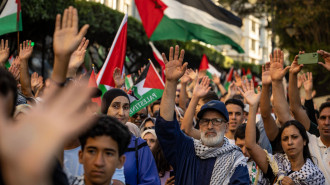Six days of Syria regime strikes kill over 240 in Eastern Ghouta
Syrian regime airstrikes killed six civilians and injured dozens in Eastern Ghouta overnight after a day of respite from deadly bombings of the rebel-held enclave.
Since 5 February, Bashar al-Assad's regime has intensified its bombardment of the besieged enclave outside of Damascus, killing more than 245 civilians including dozens of children.
On Saturday, the Damascus regime eased up its strikes on Eastern Ghouta as it faced Israeli air raids on what Israel said were regime and Iranian targets inside the country.
Regime raids picked up again on Saturday night, killing six civilians and wounding more than 50 others, the Britain-based Syrian Observatory for Human Rights monitor said.
Five of those, including two children, were killed in the region's main town of Douma, Observatory head Rami Abdel Rahman said.
Western powers have expressed alarm over the regime's campaign against Eastern Ghouta, where 400,000 people have been besieged since 2013, facing severe food and medicine shortages.
The UN Security Council is considering a draft resolution demanding a 30-day ceasefire in Syria to allow for urgent deliveries of humanitarian aid.
Sweden and Kuwait presented the measure that would also demand an immediate end to sieges, including in Eastern Ghouta.
Negotiations on the proposed measure are to begin on Monday, and diplomats said it could quickly come to a vote at the council.
The Syrian conflict began when the Baath regime, in power since 1963 and led by President Bashar al-Assad, responded with military force to peaceful protests demanding democratic reforms during the Arab Spring wave of uprisings, triggering an armed rebellion fuelled by mass defections from the Syrian army.
According to independent monitors, hundreds of thousands of civilians have been killed in the war, mostly by the regime and its powerful allies, and millions have been displaced both inside and outside of Syria. The brutal tactics pursued mainly by the regime, which have included the use of chemical weapons, sieges, mass executions and torture against civilians have led to war crimes investigations.

![Palestinians mourned the victims of an Israeli strike on Deir al-Balah [Getty]](/sites/default/files/styles/image_684x385/public/2024-11/GettyImages-2182362043.jpg?h=199d8c1f&itok=xSHZFbmc)


![The law could be enforced against teachers without prior notice [Getty]](/sites/default/files/styles/image_684x385/public/2178740715.jpeg?h=a5f2f23a&itok=hnqrCS4x)
 Follow the Middle East's top stories in English at The New Arab on Google News
Follow the Middle East's top stories in English at The New Arab on Google News


![Left-wing candidate Jill Stein campaigns in Michigan in October [Getty]](/sites/default/files/styles/image_330x185/public/2024-11/GettyImages-2176828619.jpg?h=199d8c1f&itok=h2FXzBuP)